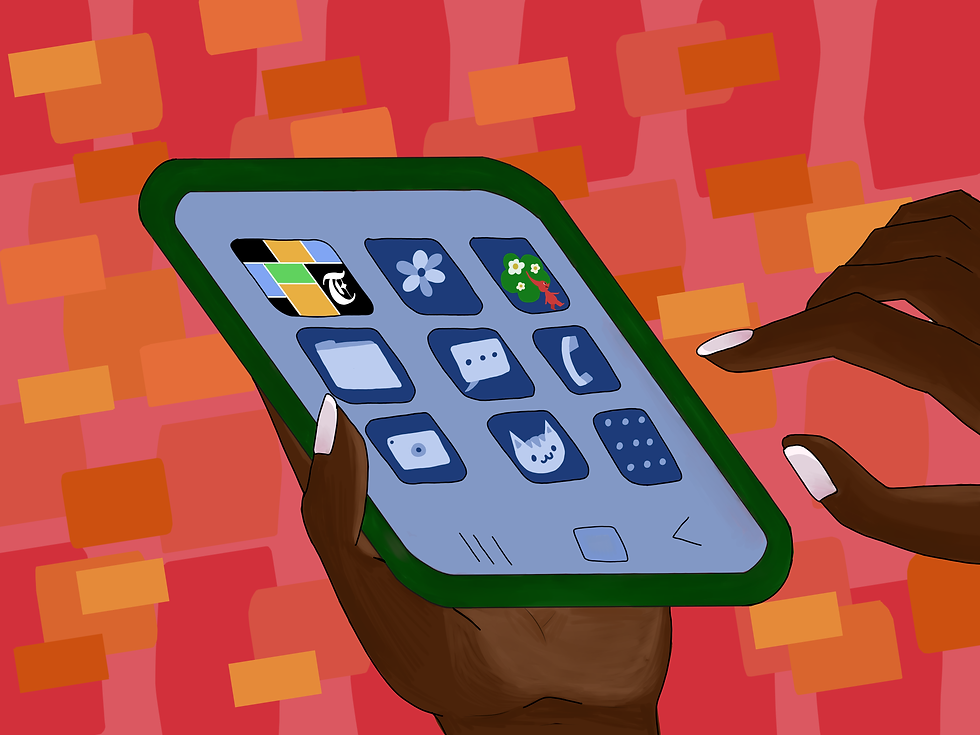You, Me, 'Can We Talk?'
- Ankita Mandal
- May 26, 2025
- 4 min read
Because even Penn Badgley can’t explain it all in one day.

Photo by Ankita Mandal/The Barnard Bulletin
May 26, 2025
“Put me in your cage, Joe!”
Penn Badgley sighed, shaking his head as laughter rippled through the audience at Columbia’s Havemeyer Hall.
It was an opening moment charged with expectation — after all, Joe was really right there, no cage and no defense from the 330 students that found their way to Havemeyer among the 800+ that RSVP’d for the event. The program titled “Can We Talk?” featured Badgley and Dr. Nura Mowzoon, a psychotherapist and professor specializing in relationships. Hosted by Columbia’s Organization of Rising Entrepreneurs (CORE), the event promised a thoughtful dive into love, obsession, and the ways we navigate intimacy in our hyper-digital, hyper-idealized world of Joes.
Of course, it was acknowledged early on how many in the audience did not just come for an academic symposium — they came to see Badgley, star of the hit Netflix show “You.” He plays the series’s brooding antihero, Joe Goldberg, whose dangerous obsessions have inspired as much critique as they have uncomfortable infatuation. Badgley’s presence alone carried a certain thrill, as if fans hoped the man behind the myth could offer profound clarity about the very behaviors his character dramatizes.
But if the night proved anything, it is that expectations — much like relationships — are slippery.
Badgley leaned into philosophical territory, circling the concept of addressing the “other.” The idea is rooted in existential thought that suggests we must see people beyond our projections and desires. For some, it felt like an elegant way of saying, “stop romanticizing people into who you want them to be.” For others, it felt frustratingly simple, like listening to someone describe the contours of division.
Sidechat, the anonymous app for students to voice their opinions on current matters, lit up mid-event. While some students spammed awkward side-shots of Badgley on a wooden chair at the front of the lecture hall, marveling at the sheer novelty of being in the room with him, others wondered aloud if the conversation would ever land on something concrete. There was a quiet undercurrent of disappointment — for an event teasing depth, it felt at times like it hovered just above the surface.
Still, beneath the fog of philosophy and celebrity dazzle, as someone in the crowd, the point of the evening felt like an ironic, essential truth: expectations from any encounter, relationship, or conversation at their healthiest are not about obsession, pedestal-building, or filling emotional needs. They are about clarity, communication, and reciprocity.
As a student attending this event, however, it was interesting to observe the dichotomy of the experience after it had concluded. Many, if not the majority, of the people in the audience had come to the event for the understandable yet superficial reason that Badgley, a celebrity, would be present. The same audience was upset with the perceived lack of depth in the topics discussed. Of course, this hypocrisy does not excuse any valid frustrations, but it leads me to think about the unrealistic expectations we set for anything, and anyone, especially for the people we admire. If we do this for a celebrity we barely know, how high of a pedestal do we build for the people we do know?
Dr. Nura Mowzoon provided a psychological foundation, grounding the conversation and my question. “Relationships are not about filling a void or losing yourself in someone else,” she said. “They’re about growth, communication, and partnership.”
Her pragmatism served as an anchor, offering attendees a way to translate lofty ideals into real-life choices. She dissected how social media and romanticized portrayals of love set us up for disappointment, often promoting unattainable ideals or high-drama love stories that distort what healthy intimacy looks like.
Badgley himself reflected on this, admitting that portraying Joe Goldberg has forced him to confront the ways we glorify toxic behaviors. His comments felt genuine, if a little meandering — as though he was still working out the answers himself. And perhaps that was part of the point: the imperfect search for meaning is, in its own way, a kind of honesty.
But both speakers steered the discussion back to its essential question: How do we love better? Even with a couple of not-as-profound-as-they-were-meant-to-be examples, the intention of creating a more inclusive climate was there. How do we resist the temptation to turn others into mirrors for our desires rather than seeing them for who they truly are?
If anything, the night’s contradictions felt like a case study of the very problem they were unpacking. An audience idolized Badgley for his portrayal of obsession, expecting profundity from the man behind the fantasy, only to be reminded that no person (celebrity or otherwise) can carry the weight of all our projections.
This observation led me to a new question. In the same way we pedestalize partners, do we also pedestalize conversations about love, hoping they’ll save us from our own confusion?
In talking about how open communication facilitates real connection, Badgley and Mowzoon attempted to make the point clear: whether celebrity or student, we are all equal. We all have something to bring to any type of relationship, and we shouldn’t lose that by putting the other person above, or below, us.
As the evening drew to a close, there were no earth-shattering revelations or five-step formulas for perfect relationships. But perhaps that was the point: real love is not a performance, nor is it a tidy thesis. It is a practice. A choice to see someone, and ourselves, with honesty. For a generation raised on fantasy romances and filtered realities (there is a whole fandom for Joe Goldberg), the discussion offered a quiet reminder. Love doesn’t need to be perfect or exhilarating or novel to be profound. And maybe the most meaningful conversations are the ones that leave us with more questions than answers.




